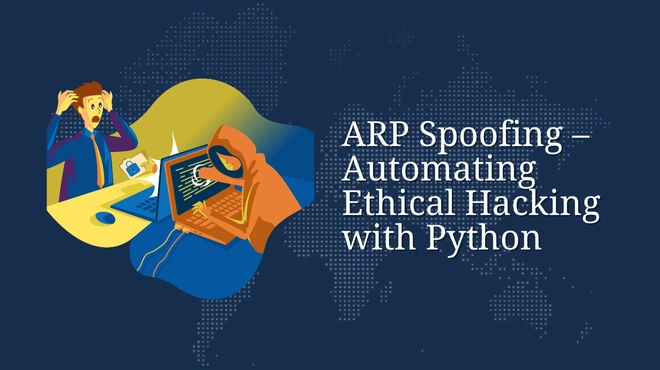
ARP Spoofing – Automating Ethical Hacking with Python
Master ARP Spoofing with Python & Scapy: Learn ARP Poisoning Mechanics, Ethical Hacking Defenses, and Enterprise-Grade Mitigation Strategies
Stop just documenting requirements. Get the elite credential that gives you a seat at the table to shape business strategy.
You're a senior business analyst, but often treated like a scribe - brought into projects after major decisions are made and told to just "document the requirements." You have the strategic insight to help the business define problems and shape solutions, but lack the credential that gets you into high-level conversations. Our business analytics certification elevates you to a strategic partner. Certified Business Analysis Professionals (CBAPs) lead enterprise analysis, influence business strategy, and command salaries 50-70% higher than uncertified peers because they are recognized as value creators, not just requirement-takers. This isn't another course that just rehashes the BABOK-Guide. Our business analytics course is designed and led by practicing CBAPs working on large-scale transformation projects in Houston, TX banking, telecom, and retail. They facilitate workshops with C-level executives, model complex enterprise architectures, and build business cases for multi-crore investments. You'll learn the BABOK framework while applying it to navigate ambiguity, influence powerful stakeholders, and drive business decisions - not just document them. Unlike programs focused on memorization, we build strategic leadership capability for BAs. Learn techniques for enterprise analysis, solution evaluation, and strategy definition that go beyond user stories and use cases. The business analytics certification proves your experience, but the real value is shifting your role from project-level order-taker to enterprise-level strategic advisor who is indispensable to the business. This program is built for experienced BAs, product owners, and systems analysts who have hit a professional ceiling. Structured for senior professionals, it includes interactive discussions, complex case studies, expert-led sessions on cracking the notoriously difficult scenario-based CBAP exam, and meticulous one-on-one support for the CBAP application process - ensuring your years of hard-earned experience meet IIBA's stringent requirements.
Learn with absolute confidence, knowing our curriculum is officially recognized and fully aligned with IIBA's stringent standards and the BABOK-Guide v3.
Unlock your potential with expert instructors who are practicing, CBAP-certified professionals guiding you through complex case studies and real-world scenarios.
Target your CBAP certification with a training schedule that respects your time. We offer weekday-evening, weekend-only, or a full 4-day bootcamp format.
Master complex concepts fast with 35 hours of hands-on training and individualized performance feedback through multiple exam simulators that mimic the real case-study format.
Demolish your weak areas with 1500+ tailor-made practice questions, mock tests, and detailed case studies that reflect the actual exam's complexity.
Be worry-free as industry experts are available 24x7 to solve your doubts and assist you at every turn - from application to certification.

Get a custom quote for your organization's training needs.
Move beyond project-level thinking. You will learn to analyze the current state, define the future state, assess risks, and craft a change strategy that delivers measurable business value.
Master advanced techniques to uncover implicit requirements from even the toughest stakeholders. You will learn to manage conflicts, drive engagement, and build lasting consensus across teams.
Stop treating requirements as static documents. You will learn to manage, trace, prioritize, and maintain requirements end-to-end, ensuring alignment with business goals. With tools like Power BI, you'll visualize dependencies and performance metrics that keep stakeholders on track.
Model, specify, and verify requirements with architectural precision. You will go beyond user stories to develop robust design options and solution recommendations that can actually be implemented.
Don't just recommend solutions - prove their value. You will master the techniques to measure solution performance, analyze results, and recommend data-backed actions that maximize business outcomes.
Plan your analysis effort from start to finish. You will learn to conduct stakeholder analysis, define governance structures, and track progress with analytics tools that provide real-time insights and keep your strategy on course.
If you have significant business analysis experience and meet IIBA's mandatory requirements, this program is engineered to get you certified.


Get the strategic roles your experience already deserves.
Reserved for certified professionals who can link projects to business value.
Drive enterprise-wide change and demonstrate measurable business impact.
The CBAP is the gold standard for senior business analysis professionals. IIBA has established strict benchmarks to ensure every certified individual has a proven track record of leading complex analysis work. Here is what you need to qualify.
7,500 Hours of Business Analysis Work Experience: This must be logged within the last 10 years.
900 Hours in 4 of the 6 BABOK Knowledge Areas: You must demonstrate depth and breadth across the BA competency spectrum.
35 Hours of Professional Development (PD): This must be completed within the last 4 years. Our training program fully satisfies this requirement.
Two Professional References: You'll need references from a career manager, client, or another CBAP recipient.
Additional Guidance: For a comprehensive breakdown of how to document your hours, please refer to our detailed FAQ section.
Go beyond basic interviews. Master advanced elicitation techniques like workshops, prototyping, and observation to uncover hidden stakeholder needs. Learn to manage complex dynamics and foster productive collaboration throughout the project lifecycle.
Learn the discipline of tracing, maintaining, prioritizing, and approving requirements to ensure they remain aligned with the business case throughout the project. Build strong governance and change management mechanisms for long-term consistency.
Develop frameworks to manage competing interests, organizational politics, and difficult stakeholders. Master techniques to build consensus, handle resistance, and influence decision-making with credibility and data-backed insights.
Learn to use industry-standard modeling techniques such as UML and BPMN to create clear, verifiable, and traceable requirements. Develop artifacts that support both business understanding and technical implementation.
Build quality from the start. Learn to perform peer reviews, walkthroughs, and validation sessions to ensure requirements are correct, complete, and fully aligned with business objectives before moving to design and development.
Move from analysis to solutioning. Learn to develop, evaluate, and recommend multiple design options that balance business goals, user needs, and technical feasibility - ensuring the best possible solution design.
Your role doesn't end after deployment. Learn to define performance metrics and KPIs, collect data, and evaluate whether the solution is delivering the intended business value and ROI.
Cut through data complexity. Learn to interpret performance results, identify root causes of underperformance, and uncover hidden improvement opportunities using structured analytical methods.
Identify the factors holding back solution or organizational success. Apply data analytics, business data analysis, and predictive modeling techniques to recommend targeted improvements that enhance overall performance and value realization.
Master the soft skills and analytical abilities that the CBAP exam implicitly tests. Strengthen your critical thinking, problem-solving, communication, and business acumen to handle scenario-based questions with confidence.
Develop expert-level exam techniques to handle long, complex case studies. Learn how to extract key insights quickly, identify relevant information, and answer groups of scenario-based questions accurately under time pressure.
Consolidate your knowledge across all Knowledge Areas (KAs). Tackle full-length mock tests, review high-weighted topics, and prepare to enter your CBAP exam with unshakeable confidence and mastery of the BABOK Guide framework.

Our experts are ready to help you with any questions about courses, admissions, or career paths. Get personalized guidance from industry professionals.
"PMI®", "PMBOK®", "PMP®", "CAPM®" and "PMI-ACP®" are registered marks of the Project Management Institute, Inc. | "CSM", "CST" are Registered Trade Marks of The Scrum Alliance, USA. | COBIT® is a trademark of ISACA® registered in the United States and other countries. | CBAP® and IIBA® are registered trademarks of International Institute of Business Analysis™.


